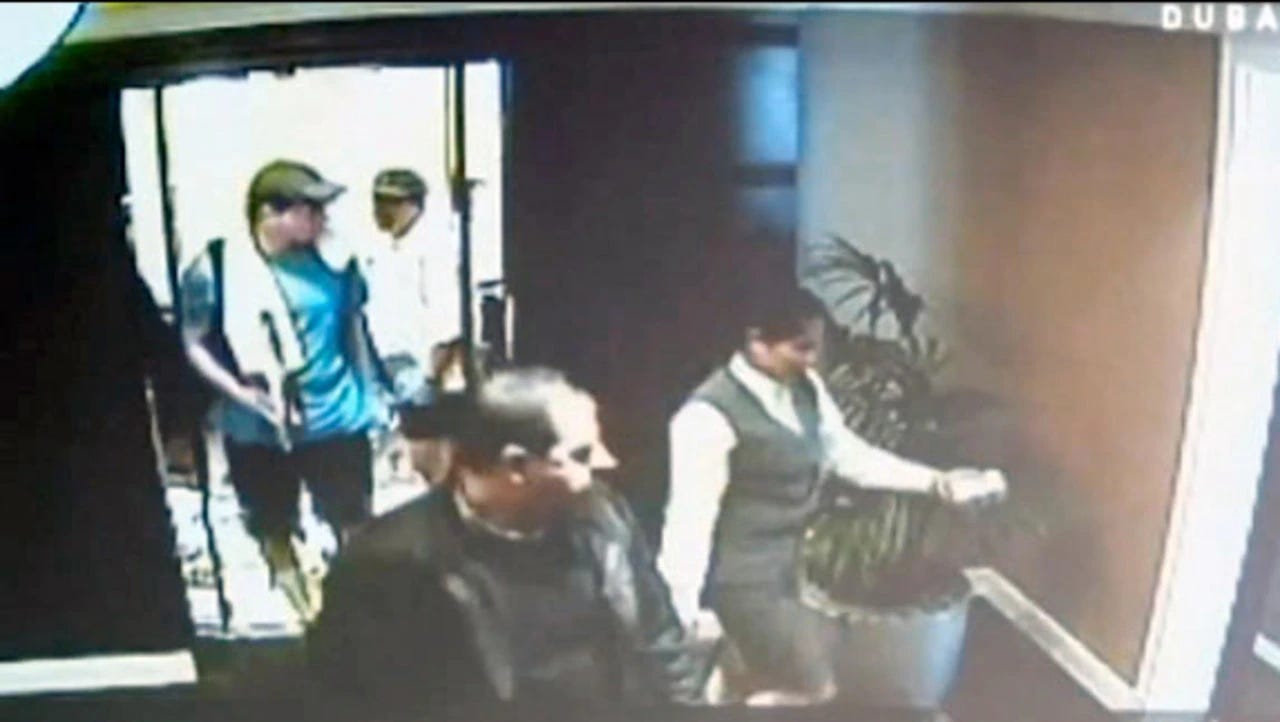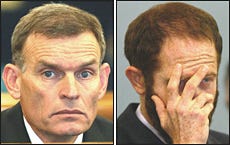Israeli Passport Bros - Mossad & New Zealand, Part 1
The comedy of errors that led to an Israeli passport theft ring in Auckland falling apart
Kia ora, thank you all for the ongoing support for Exit From Affco since I launched back in August. It’s nice to know that others are interested in getting to the bottom of what exactly is at the heart of all this “deep seated trouble throughout New Zealand”. Before we begin, I’d like to say you can now subscribe for $5 NZD a month, or $50 a year if you want to support the work I do here. I would have set it lower, but Substack has decided $5 is the lowest I can go. I have no current plans to paywall or restrict access to future posts, it’s only if you think it’s worth it. Thanks again, and enjoy the post.
In 2004, the Department of Internal Affairs and New Zealand Police stumbled across an Israeli identity theft ring operating in Auckland. A few careless mistakes resulted in the whole operation coming apart, with two spies being arrested and two fleeing the country. It led to the worst diplomatic relations New Zealand and Israel have ever had, but the saga has been swept under the rug in the intervening years.
Israel promised to never do it again, before being caught doing it again when an Israeli was found dead in the 2011 Christchurch earthquake, in possession of “at least 5 passports”. In this series, Exit From Affco will cover these little mentioned incidents, and the scale of Israeli intelligence operations in New Zealand and the surrounding region. When politicians like Deputy PM David Seymour calls Israel a “friend and ally”1, remember how they treat their “friends”.
As the foreign intelligence agency of a country that is particularly notorious for being up to no good, Israel’s Mossad finds foreign identities and passports incredibly useful. Using the cover of countries with better reputations, and more visa-free access, can make operations go a lot smoother.
In 1997, Canadian passports were used in a failed attempt to kill Hamas leader Khalid Meshaal in Jordan,2 with Israel promising never to use Canadian passports again. In 2010, following the assassination of key Hamas arms dealer Mahmoud al-Mabhouh in a Dubai hotel, Ireland, Britain, and Australia expelled Israeli diplomats suspected in being involved with forging passports used in the operation.3 PM Kevin Rudd later revealed in his autobiography that Israel had previously been caught forging passports in 2003, then vowing to never do it again.4
The Jerusalem Post reported in 2006 that back in the 1990s, Mossad agents had already been using Canadian and New Zealand passports for cover.5 While the practice was phased out for Middle Eastern operations “once the practice became widely known”, it seemed they still had some use for them. New Zealand has one of the best ranked passports in the world, ranked last year at #6 with 186 visa-free countries. Would many border agents suspect a “Kiwi backpacker” from the Antipodes in the same way they would an Israeli?
In November 2003, three Israelis arrived in New Zealand on American, Israeli and Canadian passports. Canadian-born Uriel Kelman was a 30 year old Israeli intelligence officer educated in one of Israel’s top religious schools, with a Mossad agent father.6
”For a long time, Kelman did not see his father, Israel ‘Easy’ Kelman, who for most of his son’s childhood was abroad on missions with Israeli intelligence agencies. It was a natural progression for Kelman to follow his father’s footsteps into Israeli intelligence.”
50 year old Eli Cara was another Mossad agent, at the time living in a settlement just outside the West Bank named after the founder of Zionist terror group the Stern Gang, populated by Israeli security officials like the then-Israeli Defence Minister, and ex-PM Ehud Barak.7 Cara had previously been spotted in a meeting between Mossad and Australian intelligence contacts.8 In 1998 Cara had sent two Mossad operatives to Cyprus, who were later caught and sentenced to 3 years in prison.9 November marked Cara’s 24th time in New Zealand since 2000, using the cover of operating a (seemingly non-existent) Sydney travel agency branch.10
US-born 36 year old Zev William Barkan was the third man, an ex-Israeli diplomat who’d worked for a number of years in Austria and Belgium.11 He’d previously served in the IDF as a navy diver. Barkan was the operative attempting to secure a New Zealand passport for future missions, while Cara and Kelman were there to assist. They were after the most valuable forged passports, ones under real names and identities acquired surreptitiously through regular government channels that could pass verification, compared to ones that were just forged.
To get an identity to steal, they used what is known in Hebrew as a sayan, a helper of Israeli intelligence often recruited from diaspora Jewish communities. Enter Tony Resnick, a Jewish New Zealander, who had first travelled to Israel as a teenager in the 1980s. His uncle Keith Bookman, whose kibbutz Resnick stayed in for a time, told the New Zealand Herald that “When [Tony] was young, he felt a connection to Israel and to the Zionist idea”.12 He decided to serve in the IDF as a paramedic, fighting in the Gulf War, before marrying an Israeli and working as a civilian ambulance driver in Haifa. In the late 1990s, he moved back to New Zealand with his family to work as a St. John’s paramedic, while also connecting back into the local Jewish community. He became a member of the Auckland Jewish Council, the regional branch of the New Zealand Jewish Council, and left St. John’s in 2002 to become a lecturer at AUT.13
The crew of Israeli spies selected a quadriplegic young man with cerebral palsy who had been treated through St. John’s, and lived only a few hundred metres from where Barkan was renting.14 In late November, Barkan visited a Lynfield GP using the victim’s name before leaving the country in early December, with a request for a birth certificate being placed with Internal Affairs the next day.15 The three Israelis travelled in and out of New Zealand in the intervening months, before all returning in March 2004. Barkan went again to the Lynfield GP, asking him to witness his passport application which he “needed urgently as he was soon to marry in Australia.”16 The GP obliged, and Barkan again left the country, leaving Cara and Kelman to collect the passport. Internal Affairs officer Ian Tingey grew suspicious when a well-spoken man with a North American accent rang asking if the process could be sped up, giving an unconvincing answer when questioned.
“When I quizzed him on his accent his explanation to me was he had not travelled or held a New Zealand passport before but had spent a lot of time in New Zealand with Canadian friends and family.”17
After ringing the victim’s father and realising the deception, Internal Affairs and police set up a sting operation to catch them. Attempting to throw off surveillance, the duo requested that the passport be sent to the Auckland offices of a travel document company, which the duo asked to then send to a central Auckland apartment building.18 The building manager was then called by an ex-tenant, who requested that the manager receive a package and then give it to a waiting taxi driver. Cara was waiting outside the apartment building and followed the taxi driver inside, not realising he was also being shadowed by police. The taxi driver was then told by the manager to deliver the package to an address in Freemans Bay, where Kelman was waiting. Cara was arrested before he could follow, and an officer accompanied the driver. Kelman was at the address waiting for the package, throwing his phone in the bushes once he spotted the police, but was arrested soon after.19
And so, Cara and Kelman ended up in New Zealand police custody on passport fraud charges in March 2004. Cara’s house in Australia was raided by ASIO around the same time.20 What had initially seemed like a police sting on a criminal operation soon turned into a diplomatic row when the New Zealand Herald reported in April that “senior officials believe two men arrested for trying to obtain New Zealand passports are Israeli secret service agents”.21 Then-PM Helen Clark told the Herald that the issue had been raised directly with the Israeli government. Following the arrests, the Canberra-based Israeli ambassador for New Zealand was summoned to Wellington, with acting Foreign Minister Jim Sutton reading him the “riot act” and requesting an explanation.22 They were released on bail, and police bugging of the duo all but confirmed that they were Israeli agents.
During the subsequent trial, they denied any relation to Mossad and pleaded not guilty, not helped by Kelman’s choice to wear a balaclava and sunglasses to and from court. They claimed they were just “good Samaritans” who had ran into Barkan by chance and had no knowledge of his application’s illegality, despite using cars rented under his name. In July 2004, they pled guilty to a charge of “participating in an organised crime group in an attempt to unlawfully obtain a New Zealand passport”.23 They were sentenced to 6 months in prison and ordered to donate $100,000 to the Cerebral Society in Auckland. They were deported in September after serving just 3 months in prison.
Part 2 covers the ensuing diplomatic turmoil between Israel and New Zealand, where these operatives ended up, and the strange trail Barkan left after fleeing the country, including 2 assassinations and allegations of running a snuff film studio in Cambodia. Part 3 will cover the ring exposed by the 2011 Christchurch earthquake, the strange behaviour of the Israeli government, and John Key’s sweeping of the affair under the rug.







And even back then, the ACT Party, then under Rodney Hyde, was subverted against New Zealand and acted on behalf of their sayanim paymasters. Curious views on child sexuality, and identity theft, have always gone hand in hand for the ACT Party and the zionist entity.
https://www3.parliament.nz/en/pb/hansard-debates/rhr/document/47HansS_20050315_00000461/shirley-ken-questions-for-oral-answer-questions-to